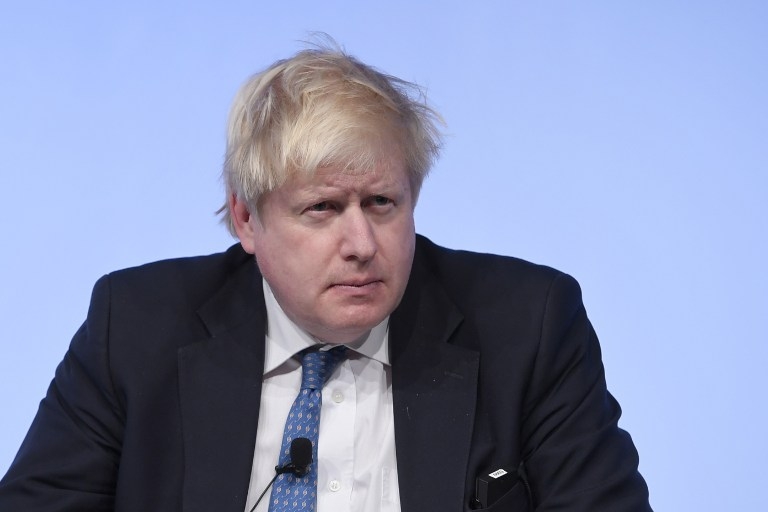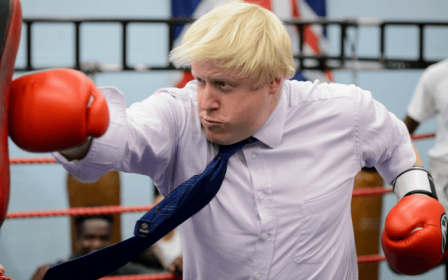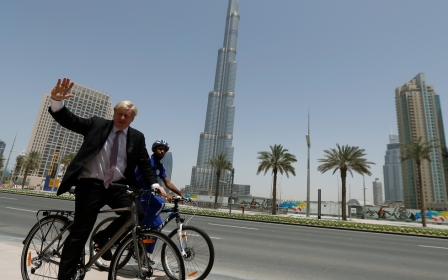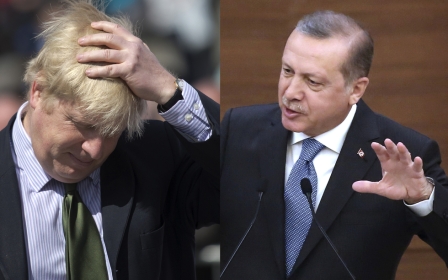Iran and Saudi Arabia are abusing Islam, Boris Johnson says

Boris Johnson accused Iran and Saudi Arabia of abusing Islam and acting as puppeteers in proxy wars throughout the Middle East.
In footage published by The Guardian on Wednesday, the foreign secretary told an audience that the behaviour of Saudi Arabia and Iran was a tragedy, adding that there was an absence of visionary leadership in the region that was willing to reach out across the Sunni-Shia divide.
“There are politicians who are twisting and abusing religion and different strains of the same religion in order to further their own political objectives," Johnson said.
"That’s one of the biggest political problems in the whole region. And the tragedy for me – and that’s why you have these proxy wars being fought the whole time in that area – is that there is not strong enough leadership in the countries themselves,” Johnson added during a conference in Rome last week.
He continued: “There are not enough big characters, big people, men or women, who are willing to reach out beyond their Sunni or Shia or whatever group to the other side and bring people together and to develop a national story again. That is what’s lacking. And that’s the tragedy.”
'The tragedy for me – and that’s why you have these proxy wars being fought the whole time in that area – is that there is not strong enough leadership in the countries themselves'
- UK foreign secretary Boris Johnson
Saudi Arabia has been accused of regarding the civil war in Syria as a contest between a largely Sunni-led opposition and an Iranian Shia-led militia. But it is unusual for UK ministers to describe the Gulf states as “puppets”.
In comments reported Thursday by The Guardian, the prime minister’s spokeswoman said that Theresa May had “full confidence in the foreign secretary” but that his views were very much his own. Johnson would keep to the government line, the spokeswoman said, when he meets with ministers from Saudi Arabia during the next few days.
She added that Riyadh was “a vital partner for the UK, particularly on counter-terrorism and, when you look at what is happening in the region, we are supportive of the Saudi-led coalition which is working in support of the legitimate government in Yemen against Houthi rebels”.
String of gaffes
Johnson’s criticism of Saudi Arabia came as May returned from a two-day visit to Bahrain where she attended the Gulf Cooperation Council summit. During the visit, she praised the Saudi royal family and celebrated its 100-year-old alliance with the UK, The Guardian said.
The British defence industry is also heavily dependent on arms contracts with the Gulf states, and the Royal Navy has established a major naval base in Bahrain. Johnson is also due to visit the Gulf this weekend.
The foreign secretary has been accused of committing a string of gaffes and some people argue that his tendency to speak frankly loses the UK allies.
READ: Rolls Royce, pants and sand: What Boris Johnson said to the Arab ambassadors
Before becoming UK foreign minister, Johnson wrote a limerick about the Turkish President Recep Tayyip Erdogan and his penchant for goats, compared the ambitions of the EU with those of Hitler and accused US president Barack Obama of having an "ancestral dislike of the British empire" because of his "part-Kenyan" heritage.
Since his appointment in July, he has been accused of "unbelievable arrogance" for offering to help Turkey join the EU after warning during the referendum campaign of hordes of Turkish citizens coming to the UK.
He was also accused of offending Italian Economic Development Minister Carlo Calenda, by allegedly telling him that Italy would sell less prosecco if the European Union did not allow Britain to remain in the single market.
In a fringe event hosted by the ambassador of Kuwait at October's Conservative Party conference, he joked about “selling sand to Saudi Arabia” and exporting British underpants “all over the place”.
And when Donald Trump was elected US president in November, Johnson told European leaders to stop the "collective whinge-o-rama" about Trump's election and refused to attend an EU meeting to discuss the future under the new US administration.
New MEE newsletter: Jerusalem Dispatch
Sign up to get the latest insights and analysis on Israel-Palestine, alongside Turkey Unpacked and other MEE newsletters
Middle East Eye delivers independent and unrivalled coverage and analysis of the Middle East, North Africa and beyond. To learn more about republishing this content and the associated fees, please fill out this form. More about MEE can be found here.




